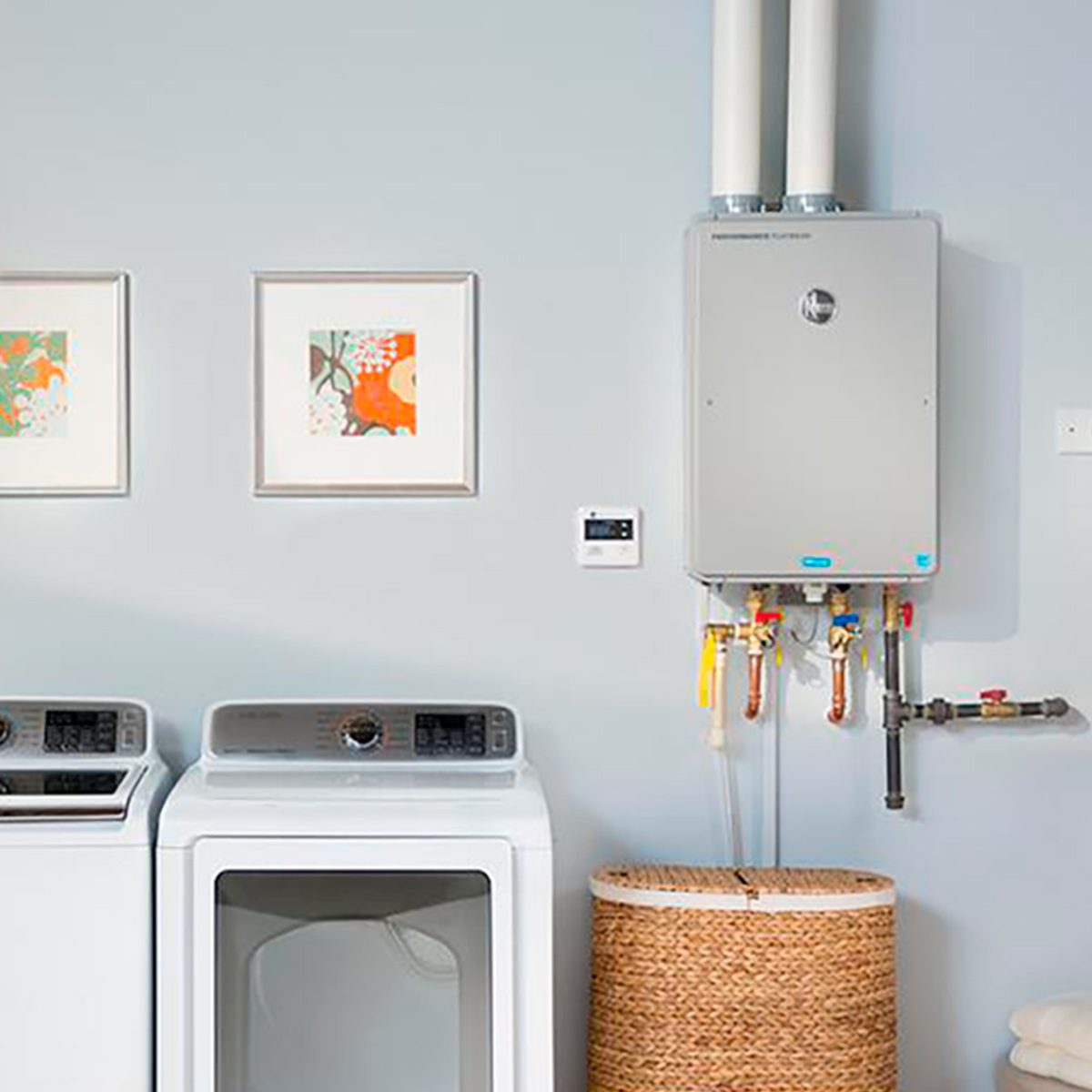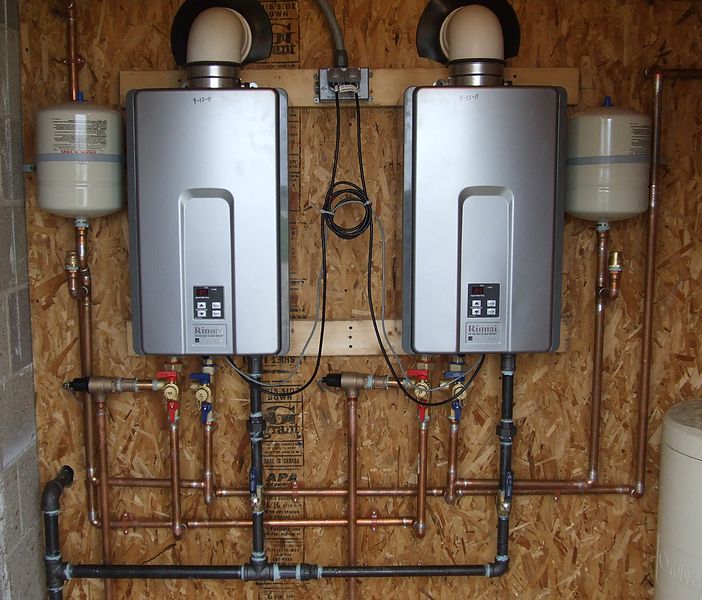My Introduction To The Gains Of Smart Water Heaters
My Introduction To The Gains Of Smart Water Heaters
Blog Article
This article down below on the subject of Why You Should Consider a Tankless Water Heater is fairly interesting. Give it a try and make your own final thoughts.

In a globe where convenience and effectiveness preponderate, it's not a surprise that homeowners are constantly on the lookout for smarter methods to manage their home's energy usage and comfort. One advancement that has actually progressively gained appeal is the tankless water heater. However just what makes these systems stand apart from the standard tank-based versions the majority of us matured with? Allow's dive in and discover the advantages of tankless water heaters, helping you decide if it's time to make the button in your home.
Introduction
Image this: you step into the shower after a lengthy day, anticipating a comforting waterfall of warm water, just to be welcomed by icy beads since the last individual utilized everything up. Audio acquainted? Standard water heaters keep a fixed amount of hot water, suggesting you go to the grace of that container's supply. Tankless systems, on the other hand, warm water on demand. No more going out mid-shower, no more fumbling with schedules simply to make sure warm water is readily available.
Comprehending Tankless Water Heaters
What Are Tankless Hot Water Heater?
Tankless water heaters, sometimes referred to as on-demand or immediate hot water heater, give hot water just as it's required. As opposed to saving gallons of pre-heated water, these devices kick into activity the minute you turn on the faucet. Water goes through a warm exchanger, heating up in real-time, implying you obtain a nonstop circulation of warm water without the demand for a large storage tank resting idly by.
How Do They Vary from Standard Solutions?
Standard heating units hold a reservoir of hot water, using energy to keep that container at a constant temperature. Tankless systems get rid of the standing supply, cutting down on thrown away power and the cumbersome footprint of a big cylinder. Essentially, you're upgrading from a "stockpile" way of thinking to a "made-to-order" approach.
Typical Types of Tankless Units
Tankless water heaters normally come in two ranges: gas and electric. Gas designs often tend to deliver greater circulation rates, perfect for bigger houses, while electric versions typically offer smaller homes and are normally much easier to install. In addition, some systems are made for point-of-use (offering one component) while others can take care of the entire home's hot water demands.
Secret Benefits of Tankless Water Heaters
Power Effectiveness and Price Financial Savings
Say goodbye to heating up a titan tank's worth of water and keeping it cozy all day. Tankless heating systems decrease standby energy losses, which can reduce utility costs. While the preliminary cost could be greater, the long-term savings commonly warrant the financial investment.
3. Space-Saving Style
If your home is short on storage space, getting rid of the bulky container liberates beneficial room. Tankless devices are small and can often be placed on wall surfaces, stashed in corners, or mounted in tight energy storage rooms without grabbing all of the entire area.
4. Longer Lifespan
A well-maintained tankless water heater can outlive its tank-based relative. Standard containers might last 10-15 years, while tankless versions can maintain downing along for two decades or more, making them a strong financial investment over time.
1. Unlimited Warm Water Supply
Ever needed to arrange showers so every person obtains their reasonable share of hot water? With tankless, that ends up being a thing of the past. As long as the heating unit's circulation ability isn't gone beyond, you can take back-to-back showers without becoming a popsicle.
5. Improved Water High Quality
Saving water in a container can sometimes lead to debris buildup or a slightly "off" preference. With tankless systems, fresh water is heated instantly, minimizing the possibilities of sediment buildup and potentially providing cleaner-tasting water.
Considerations Prior To Changing
Though the advantages are engaging, it's smart to take into consideration a few factors before completely committing.
Reviewing Your Home's Water Usage Patterns
If your house all at once makes use of multiple components with high hot water demand, make sure the system's circulation rate fulfills your requirements. Understanding your use patterns assists you pick the ideal dimension and sort of tankless heating unit.
Maintenance and Care Tips
Tankless systems are fairly low upkeep, yet they aren't set-it-and-forget-it home appliances.
Routine Cleaning and Descaling
Difficult water minerals can build up in the warm exchanger, impacting effectiveness. Normal descaling (frequently recommended yearly) keeps the system performing at peak performance.
Annual Professional Assessments
A yearly checkup from an expert guarantees minor issues are captured early. They'll analyze the unit's efficiency, try to find leaks, and assist preserve optimum efficiency.
First Financial Investment Costs
Tankless heating units commonly include a greater in advance cost. Between the system itself and potential setup alterations, the preliminary cost could offer you sticker label shock. Yet bear in mind to see it as a long-term investment.
Installment Requirements
Relying on your home's framework, you may require additional electrical capacity or gas line upgrades. Guarantee you recognize the installment requirements and talk to an expert to prevent shocks.
Making Certain Correct Air Flow
For gas versions, appropriate air flow is important to securely eliminate exhaust gases. See to it venting systems are tidy and correctly set up to stop any type of potential security risks.
Comparing Different Brands and Versions
Not all tankless water heaters are produced equivalent.
Researching Dependable Producers
Seek trustworthy brands with a background of generating quality systems. A reputable supplier frequently provides better client support and longer service warranties.
Installation: DIY or Professional?
While some house owners cherish taking on jobs themselves, tankless installation may not be the best time to break out the tool kit.
Advantages and disadvantages of DIY Installation
A do it yourself mount might save money, yet it includes risks. Incorrect setup can cause inadequacy or safety and security concerns. If you're handy and have experience, it could be practical-- yet proceed with caution.
Reading Testimonials and Customer Feedback
User reviews and comments from neighbors or pals who have gone tankless can supply useful insights. Sometimes, real-life experiences can be more informing than advertising and marketing pamphlets.
When to Call a Professional Plumber
For a lot of, calling a professional makes sure everything's done appropriately. A specialist plumbing professional understands regional codes, sizing requirements, and airing vent specifications, minimizing the threat of mishaps.
Maximizing Effectiveness
You have actually bought a tankless unit-- currently optimize its performance.
Optimal Temperature Settings
Lots of people set their devices in between 120-140 F. Adjusting the temperature level can boost convenience and cost savings. Experiment to discover a sweet place that does not squander energy.
Coupling With Low-Flow Fixtures
Wish to stretch your device's abilities? Consider setting up low-flow showerheads and taps. They minimize water usage, enabling your tankless system to deliver a constant stream of warm water without straining.
Ecological Impact
Tankless hot water heater straighten with greener living objectives.
Lowered Carbon Impact
By using less power and only home heating water as needed, tankless systems can decrease your home's carbon footprint, lowering your environmental impact.
Conserving Natural Resources
Much less power consumption and much less thrown away hot water translate into fewer natural deposits being made use of, an environmental win-win.
Who Benefits Most from Tankless Heating systems?
The elegance of tankless heating systems is that they can match a selection of houses.
Huge Family Members vs. Solitary Passengers
Big households might enjoy the limitless warm water supply, while single occupants value the energy cost savings from not heating a whole storage tank for just a single person's morning shower.
Property Owners with Restricted Room
If your home is short on square video, losing the large tank liberates room for other basics-- or perhaps simply much more breathing space.
Eco-Conscious Customers
Going tankless aligns with eco-friendly worths, ensuring you're not losing power or resources.
Future Patterns in Tankless Hot Water Heater
The world of home devices is ever-evolving, and tankless water heaters are no exception.
Developments in Modern technology
R&D is frequently improving warm exchangers, making devices more effective and sturdy. Future versions might be also quieter, extra compact, and much better fit for differing environments.
Smart Home Assimilation
Think of changing your hot water heater's temperature using an app or receiving upkeep informs on your phone. As smart home tech breakthroughs, we'll see more connectivity and comfort.
Verdict
Selecting a tankless hot water heater is greater than simply updating your home's warm water system; it's investing in long-term comfort, energy effectiveness, and a greener way of life. By considering your family's water use, bearing in mind setup demands, and dedicating to routine maintenance, you can enjoy a steady stream of warm water without the baggage of a bulky container. As modern technology develops, you can anticipate also smarter, a lot more efficient tankless options that not only make your life less complicated but likewise profit the earth.
Pros and Cons of Tankless Water Heaters
Tankless Water Heater Pros
Saves Energy: Simply put, you re spending less energy to create hot water, so your total carbon footprint goes down, not to mention your bills. Lasts Longer Than Storage Tanks: Storage tank units need to be replaced every 15 years or so. But tankless units? They can last for 30 years before they give out on you. Constant Hot Water: Need to take a shower and don t want the water running cold? Awesome it won t. The water will stay hot the entire time because it creates hot water on demand. Saves You Money: Less water usage equals less money. Beyond that, you re not paying to keep water hot 24/7. Those savings add up quickly. Better for the Environment: Less water waste is better for everyone. It saves you money, but it s also environmentally conscious at the same time. Tankless Water Heater Cons
It Can Take a Minute: Depending on your specific unit and its placement, it can take anywhere from 10 seconds to 2 minutes to fully heat up. Because there s no storage tank, it heats water as you need it. Upfront Purchase Price: While we talked about their longevity, there s sticker shock when you look at brand-new tankless units to install. It pays for itself, but it s still a big chunk of change at first. Has its Limits: If you run multiple appliances at once, such as the dishwasher, washing machine, and maybe you take a shower at the same time, there might not be enough hot water. https://www.airsouthnow.com/blog/water-heater-service/pros-and-cons-of-tankless-water-heaters/

As a reader on 5 Benefits of Tankless Water Heaters, I assumed sharing that article was a good idea. For those who enjoyed reading our blog entry plz consider to share it. Many thanks for taking the time to read it.
Instant Quote Report this page